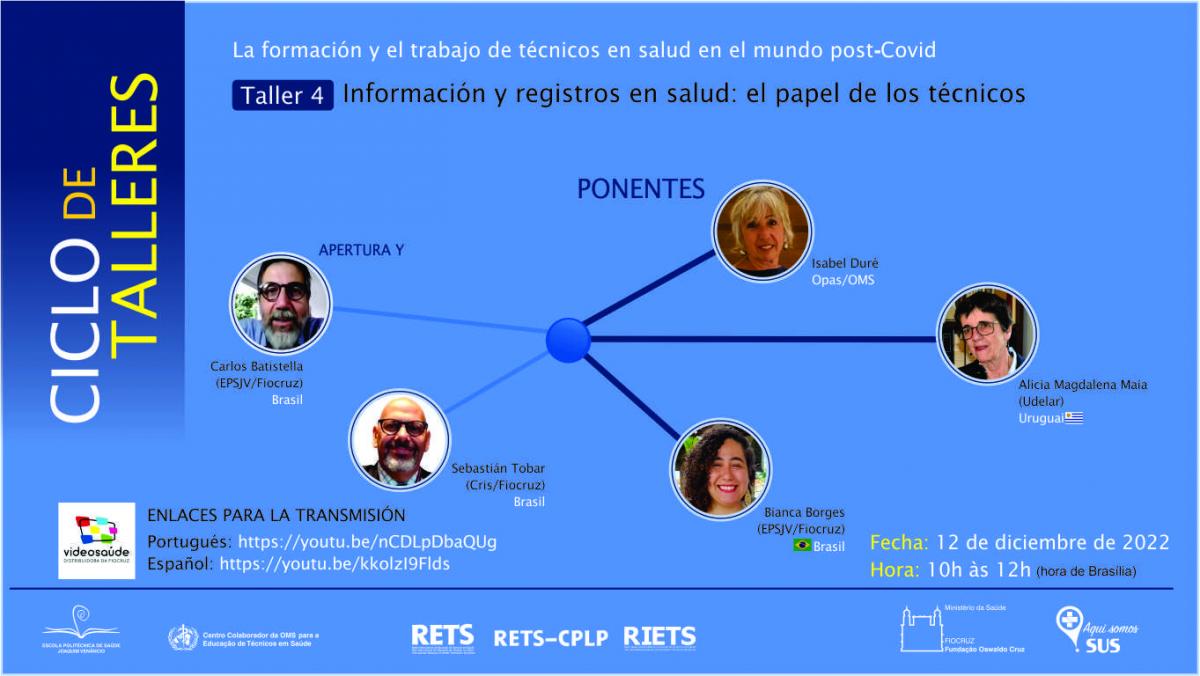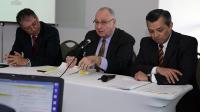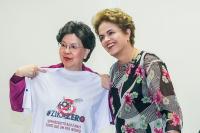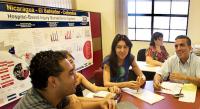Next workshop will discuss the role of the sector's technicians in the generation and use of health information and records

The fourth event of the Workshop Cycle "The training and work of health technicians in the post-Covid world" will be held on December 12 (Monday), from 10 am to 12 pm, and will focus on the role of technicians in the generation and use of health information and records that make up the health information systems of their countries. Mediated by Sebastián Tobar, advisor of the Center for International Relations in Health (Cris) at Fiocruz, and Carlos Eduardo Batistella, coordinator of International Cooperation at the Joaquim Venãncio Polytechnic School of Health (EPSJV/Fiocruz), the workshop will bring together Isabel Duré, Consultant in Policies and Management of Human Resources for Health at PAHO/WHO; Alicia Madalena Ferreira Mais, from the School of Economic Sciences and Administration of the University of the Republic (FCEA/Udelar - Uruguay); and Bianca Borges Leandro, professor, and researcher from EPSJV. Participate, learn more about the topic and contribute to the enrichment of the debate!
Cycle of Workshops "The Training and Work of Health Technicians in the Post-Covid-19 World"
Workshop 4 - 'Health information and records: the role of technicians
-
Date: December 12, 2022 (monday)
-
Time: 10:00 a.m. to 12:30 p.m. (Brasília)
-
Transmission in Portuguese: https://youtu.be/nCDLpDbaQUg
-
Transmission in Spanish: https://youtu.be/kkolzI9Flds
About the topic
Health systems are composed of numerous components (health centers, specialized outpatient clinics, pharmacies, hospitals, etc.), which perform various types of actions (medical consultations, vaccination, health surveillance, etc.) and which should be interconnected and should interact appropriately to provide organized care, with practices aimed at individual and collective care at different levels of health care.
According to the World Health Organization (WHO), Health Information Systems (HIS) represent "a set of components that act in an integrated way through mechanisms of collection, processing, analysis, and transmission of the necessary and timely information to implement decision processes in the Health System". In this sense, we can consider information as a reducer of uncertainty, capable of pointing out priorities and guiding responsible planning and the execution of actions that condition the reality to the necessary transformations. It is important, however, to highlight that this information is never neutral. They reflect the conceptions, values, foundations, assumptions, worldview, and particularly the conception of the health care model adopted in the countries.
The HIS must be conceived as a producer of knowledge and as a descriptor of reality, becoming a fundamental instrument for the decision-making process, whether in the technical dimension or in the dimension of policies to be formulated and implemented. It is important to remember that the countries with greater information capacity presented more efficient responses during the pandemic and that in the post-pandemic scenario, Primary Health Care has been considered strategic in responding to the demands and expanded health needs of the population.
The HIS must be able to guarantee the obtaining and transformation of data into information and must consider the existence of professionals involved in the processes of selection, and collection - from those performed in the territories to those collected in high complexity services - classification, storage, analysis, dissemination and retrieval of data, as well as the available technologies. It is essential, therefore, that health workers at all levels understand the role of these systems and are trained to contribute to the construction of collection instruments, for the correct capture of data, and information processing.
It is worth pointing out that, in addition to the workers and managers of the health systems, the information in the HIS will be used by: other government sectors directly or indirectly involved with actions aimed at improving the quality of life of the population (education, environment, basic sanitation, social action, etc.), popular organizations and non-governmental organizations, political parties, and by the population in general.
The objective of this workshop is to promote the discussion of some theoretical and practical aspects of the theme of health information and records, based on the presentations of our guests. We intend to evaluate how the work of health technicians is related to this theme and to what extent the training of these workers has contributed to improve their relationship with the HIS.
Our guests
-
Isabel Duré – Former Director of Human Capital and Occupational Health in Argentina, she currently works as a Consultant on Human Resources for Health Policy and Management at PAHO/WHO, working in the Regional Team on Human Resources for Health Information Systems and the Virtual Campus on Public Health.
-
Alicia Magdalena Ferreira Maia – After training as a Medical Records Technician at the University School of Medical Technologies of the University of the Republic, Uruguay, Alicia Ferreira Maia earned, among other things, a degree in medicine, with a master's degree in Health Services Policies and Management, from the University of Bologna. For 24 years she was a lecturer at the Escuela de Tecnologias Medicas. She currently teaches Health Information Systems in the graduate course in Health Services Management at the School of Economic Sciences and Administration at Udelar.
-
Bianca Borges Leandro – Bianca started her professional life as a middle-level technician in Health Services Management at EPSJV. She then earned a bachelor's degree in Collective Health from the Federal University of Rio de Janeiro (UFRJ) and a master's degree in Health Surveillance from the National School of Public Health at the Oswaldo Cruz Foundation (ENSP/FIOCRUZ). She is currently a professor and researcher at the Escola Politécnica de Saúde Joaquim Venâncio of the Oswaldo Cruz Foundation, working in the Laboratory of Professional Education in Health Information and Registries, of which she has been a coordinator.
Some of the issues that will mobilize our debate
-
What is the role of international organizations in the issue of health information and records? Have there been any changes in the national health information systems because of the pandemic?
-
To what extent does the training of technicians, especially those who are not specifically technicians in the area, consider this issue? What is the role of technicians in the production of information for the SIS? How is this work perceived by the technicians?Quais as maiores dificuldades encontradas para garantir a qualidade da informação? Como se dá a incorporação de instrumentos e recursos tecnológicos no processo de trabalho dos técnicos da APS? Existem iniciativas de formação digital para esses trabalhadores?
-
To what extent does the data collected by the technicians return relevant information for their work in the territories?
-
Do they participate in moments of information analysis for decision-making? Do they recognize the uses and importance of the data collected for Primary Health Care financing and planning? What information is really important in the context of PHC?
-
How is information that is not in the formal fields of the information sheets handled?
About the workshop cycle
The workshop cycle is an EPSJV/Fiocruz initiative, in cooperation with the International Network for the Education of Health Technicians (RETS), the Ibero-American Network for the Education of Health Technicians, and the Network of Technical Health Schools of the Community of Portuguese-Speaking Countries (RETS-CPLP).
The purpose of the events, which are supported by the PAHO/WHO Sub-Regional Program for South America and the Center for International Relations in Health of the Oswaldo Cruz Foundation (Cris/Fiocruz), is to create a privileged space for exchange, reflection, learning, and formulation of proposals on the concrete experiences of how different health technician training institutions face their challenges and seek to improve their performance. The workshops are broadcasted via YouTube, in Portuguese and Spanish, by VideoSaúde Distribuidora of Fiocruz.



